On a pleasant Aug. 7 morning, nearly 40 individuals
with a keen stake in the county’s future gathered at the rustic and
nicely restored
James P. Davis Hall on the lovely Wyandotte County Lake in the park that
bears its name.
This was the fourth in a continuing series of county economic development
forums hosted by Ingram’s magazine. Co-chairing the forum was Carol
Marinovich, mayor/CEO of the Unified Government of Wyandotte County/Kansas
City, Kan., and Cindy Cash of the Kansas City, Kan. Chamber of Commerce.
To launch the proceedings Mayor Marinovich gave a brief update on the
state of the county. She noted the Unified Government has a dual focus:
stimulating growth opportunities in the county’s western part and
encouraging the restoration of the urban core. "There still are a
lot of challenges" in the rebuilding process, she acknowledged, but
she remains entirely optimistic about the future.Seated around the Hall's
large conference table were a formidable group of interested parties,
among them:
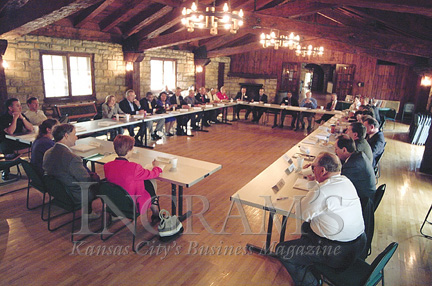
Participants Include:
George Powell, BPU
Russell Archilett, Great Wolf Lodge
Garry Kemp, Greater KC Building & Trades Council
Gary Grable, Guarantee Bank & Trust
Kevin Nunnink, Integra Realty Tesources
Bill Dunn, Jr., J.E. Dunn Construction
Al Walker, Kansas Gas Service
Jeff Boerger, Kansas Speedway
Dr. Tom Burke, KCK Community College
Dr. Delores Pinkard, KCK Community College
Ray Daniels, KCK Schools USD 500
Tom Noffsinger, KU Medical Center Research Institute
Irv Sims, Mount Carmel Redevelopment District
Rob Pearcy, PTK Communications
Pat Sedlock, Pat Sedlock Commercial Real Estate
Dan Lowe, RED Development
Terry Robinson, Robinson Delivery Services
Wendy Wilson, Rosedale Development Association
David Zimmer, The Zimmer Companies
John McTaggart, Tiny Signs
Tom Cooley, Unified Government Commission
Nathan Barnes, Unified Government Commission
Dennis Hayes, Unified Government
Denise Oakley, Unified Government
LaVert Murray, Unified Government, Development
Wendell Maddox, United Way of Wyandotte County
Susan Rohrer, Wyandotte County Community Foundation
Bill Epperheimer, Wyandotte Health Foundation
Irene Caudillo, Youth Opportunities Unlimited
Kevin Pistilli, The Pistilli Group/Hilton Garden Inn
Kurt Mayo, Hilton Garden Inn
Barbara Hake, Kansas Department of Commerce
.
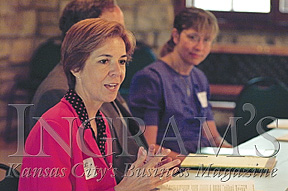
Mayor Carol Marinovich leads the Wyandotte County
Economic Development Assembly.
Transformation
No county in the metropolitan Kansas City area has shifted its outlook as dramatically as Wyandotte, a transformation that traces to the change in government that took place about five years back.
"The county’s single biggest success," said Gary Grable, speaking for many, "is the Unified Government," a major structural change the people overwhelmingly approved.
In a nutshell, the city of Kansas City, Kan., merged its government into the county’s. The result was the so-called Unified Government of Wyandotte County/Kansas City, Kan. The new name may be a bit unwieldy, but the residents seem to like it. As LaVert Murray explained, the name allows people to choose their preferred place of residence and describe their form in government all in one name, "the best of both worlds.".
Although two smaller cities in the western
part of the county—Edwardsville and Bonner Springs—have retained
their autonomy, more than 90% of Wyandotte Countians have only one form
of local government. And 100% of them now benefit from the improved service
delivery derived from unification. "After
unification became a reality," said Grable, "good, positive
things began to happen."
"I feel I have bragging rights now that I did not have a few years
ago," Pat Sedlock agreed. "This county with Unified Government
has accomplished more in the last few years than several administrations
before them."
"I would like to commend you all," said Kevin Nunnik, whose
firm works throughout the metropolitan area. "You have turned the
corner." Now, he added, people in the rest of the metropolitan area
"are trying to emulate you."Rob Pearcy concurred. He told of
how he was in a high-level investment meeting on the Missouri side, and
one participant said something that would have been unthinkable just a
few years back: "We really need to look at what Kansas City, Kan.,
is doing right now." This was a turning point indeed."
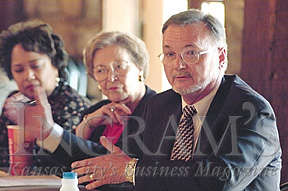
Garry Kemp describes the development "renaissance"
occuring in western Wyandotte County.
Deloris Pinkard and Pat Sedlock observe.
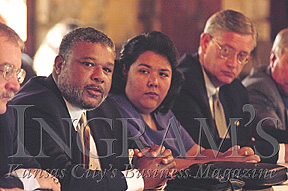
Wendell Maddox discusses the delivery
of community
services to county residents. Irene Caudillo
and Dennis Hays look on.
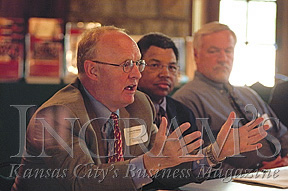
Kevin Nunnink reports of the positive progress
that is
occurring throughout the county. Terry Robinson
and Tom Noffsinger observe.
Driving the Growth
Virtually all agreed that the
great stimulus to the county’s transformation has been the development
of the Kansas Speedway and the surrounding Tourism District now called,
as Rob Pearcy gently reminded his colleagues, "Village West."
Garry Kemp described the development in the western part of the county
as a genuine "renaissance opportunity," one that is rarely
visited upon any county, let alone an older one like Wyandotte. Bill
Dunn likewise described Wyandotte County as being in the throes of a
renaissance. George Powell acknowledged his marketing efforts lead with
the Speedway, the economic engine that is, as the slogan reads, "Driving
the growth." Said Dan Lowe, the story behind the speedway and the
Tourism District is the one that everyone hears about, and it presents
a great marketing opportunity for the Unified Government.
As she drives along I-435, Carol Marinovich contended, she sees dramatic
changes over the last several years. The planners had hoped to make
the new Kansas Speedway and surrounding area a retail destination. "That
is exactly what happened."
Denise Oakley observed that the Village West area has "already
far exceeded what I had originally thought was possible," Indeed,
she added, "It was beyond anyone’s understanding." Said
Bill Epperheimer speaking for the group, "We are all ecstatic about
the speedway and the retail development." Russell Archuleta was
enthused about how the district has stimulated new support services
like restaurants, not to mention The Great Wolf Lodge that he will manage.
Jeff Boerger of the Kansas Speedway spoke to the issue from another
perspective, that of a direct beneficiary. In fact, he spoke highly
of the "the public private partnership that made the speedway possible
and thanked everyone in the room for their "great contribution."
"No one in the country has done what we have done here in Wyandotte
County," said Boerger sincerely. "It’s a great opportunity
that is only going to get better." No one disagreed..
Balance
LaVert Murray was the first to voice a theme that would resonate throughout
the morning. "The county’s greatest opportunity," he said,
"is achieving balance, a balance of growth between the eastern part
of city and the west and the closing of the gap perceived between the
two sectors."
Rob Pearcy echoed Murray’s sentiments. "Balance is critical
to the future of the community," he said. "The groundwork is
in place and the interest is there. We must take advantage." Said
Dan Lowe, "The development community sees great opportunity in Wyandotte
County as a whole community."
Others elaborated on what form that balance might take. The most obvious
counterweight to the development out west would seem to be a resurgent
downtown, what Kevin Pistilli called "the continued redevelopment
of the urban core." Bill Dunn talked of the enthusiasm within his
company in "helping to build a new block downtown, with the Reardon
Center as the crown jewel." Added Kurt Mayo of the Hilton Garden
Inn, "We are delighted to be opening a new hotel downtown and excited
about downtown development."
The possibilities excited Al Walker as well. "There is a fabulous
urban core," he stated. "The community will continue to flourish
once again."
"We have to give focus to the retail initiative," added LaVert
Murray in a related vein, "so that we can stabilize the older areas
of city." Wendell Maddox talked of the process already in place "to
connect our community with services and to better understand how the community
is using services."
Other areas of the county are filling in as well. In the southeast portion,
as Tom Noffsinger pointed out, Kansas University’s major focus on
biomedical research and growth is pumping millions into renovation and
new research facilities at its medical center. Keith Poisson spoke of
the redevelopment efforts at the Bethany campus in the eastern end of
the county and the expansion of tertiary services at the Providence campus
toward the west.
Wendy Wilson saw a great opportunity in affordable land, "and there
are still lots left." David Zimmer related that the existing industrial
base in the older parts of the county is proving to be "a great place
for younger companies to get started." Said Kevin Nunnik, "In
all four corners of the county, positive things are happening." And
again, no one disagreed."
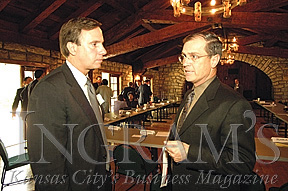
Bill Dunn and Kevin Pistilli
discuss the downtown block where
their partnership has developed the Hilton Garden Inn.
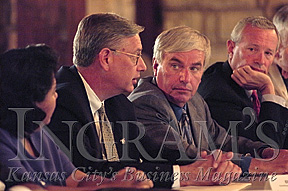
Dennis Hays commends the development team
working
for and with Unified Government. Tom Burke and
Commissioner Tom Cooley are to his left.
Coming Home
The development resurgence has created real
optimism for the first time in decades that the county will reverse its
historic pattern of population loss, what Tom Cooley calls "affluent
flight." Cooley argued that the term "white flight" was
a misnomer as race was never really the issue. "The challenge,"
he contended, "is to attract some of that affluent flight back."
Cindy Cash was one of the many participants who believe this is likely.
"When I think of all the growth and all the opportunities,"
she enthused, "I look at jobs to attract new people to our community
and to encourage young people to get education in our schools. I look
at it as a way to retain citizens and grow new families." Agreed
Ray Daniels, "There is a great opportunity to keep young people in
the community."
As Kevin Nunnik advised, "The first step is to create jobs,"
and jobs almost inevitably lead to housing and housing to schools. George
Powell reinforced the point: "Housing opportunities will tie the
community together and create the ability to cause a resurgence."
"It is most important," affirmed Pat Sedlock, "to develop
housing of various types and affordability." The talk here was more
than speculative. "Residential development is an excellent opportunity,"
elaborated Tom Cooley. "We are seeing see signs of it all around
the county." In fact, Bill Epperheimer boldly anticipates a genuine
"housing explosion."
The quality of the county’s schools—Ray Daniels described them
as "four excellent school districts and a wonderful parochial district"—should
help spur residential development. Several people, in fact, alluded to
the county students’ high ACT scores—scores that Nunnik compared
favorably to those at the private and prestigious Rockhurst High School."
User Friendly
One of the county’s virtues that all
agreed should be promoted is its ability and willingness to facilitate
economic development. "I think we ought to market our spirit of cooperation,"
said Wendy Wilson, whose experience over time has given her a good comparative
sense of how counties work or don’t work. "This is a very open,
very fair process for developers." She added, "It’s not
an adversarial relationship. It’s very much about working together."
A newcomer to the county, Russell Archuleta confirmed Wilson’s description,
praising the Unified Government for its "open mindedness and approachability."
"We have a very strong economic development team," said County
Administrator Dennis Hays. "When an opportunity presents itself,
that team comes together and responds."
Barbara Hake of the Kansas Department of Commerce and Housing expressed
her appreciation for "the opportunity to work as a team to bring
business to Wyandotte County," a team the state actively supports.
Gary Gable noted he was seeing repeat business from outside developers
because "they liked the way they were treated in Wyandotte County."
"People are taking notice," said Bill Dunn. "They see that
we will roll up our sleeves."
The cooperation of the diverse groups within the city has smoothed the
county’s development. "We have built so many great relationships
with so many groups," said Susan Rohrer. "It helps us navigate."
"This is an extremely diverse community," said Al Walker. "You
won’t see this elsewhere." Irene Caudillo agreed: "Our
quality programs are built upon a tradition of diversity." Susan
Rohrer proudly noted the county was "built on an immigrant philosophy"
that still drives much of the county’s commerce.
Deloris Pinkard focused on the word "inclusiveness" rather than
on "diversity" to explain the county’s recent successes.
"This may be the most positive asset," she enthused, "the
experience as a community of working with a vast array of peoples."
She also believes that the experience of living and working with so many
different kinds of people gives the county’s younger generation a
head start..
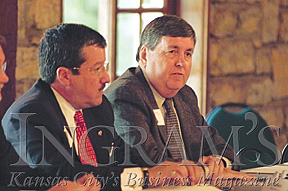
Ray Daniels of the KCK School District, USD 500 discusses
the quality schools throughout the county. Kurt Mayo is on his right.
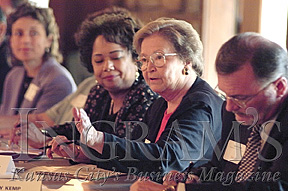
Pat Sedlock discusses the increase in
property values.
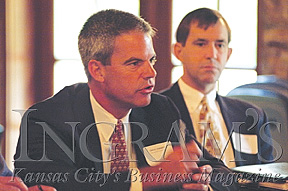
David Zimmer recommends that Wyandotte County
should market to companies within the KC metro area.
Location
In a centrally located area like metropolitan Kansas City, residents tend
to take location for granted. But the folks in Wyandotte feel that theirs
is the most accessible slice of an altogether accessible metropolis.
Tom Burke noted with irony that the highway infrastructure is so good
in Wyandotte County that "it was too easy to get out." Now,
he added, the county is using that same infrastructure to bring people
back in.
Several participants mentioned the highways and ease of access as among
the county’s great virtues. The highways are such in Wyandotte County
that one can live on a farm and still be 20 minutes from the airport and
10 minutes from downtown Kansas City, Mo.
Said Barbara Hake with conviction, "Developers look at the location,
they look at the highways, they look at the large pool of workers that
are easy to access." When it comes to location, affirmed Cindy Cash,
"We’ve got it!"
One concern with a change as dramatic as the one transforming Wyandotte County is not everyone knows about it, both beyond the county and within. This was a worry for many of those in attendance. "The determination of truth," said Tom Burke succinctly—if a bit cryptically—"is our major challenge."
"The recurring theme," said Garry Kemp, "comes back to the word marketing." Despite what he described as "great efforts" in a number of directions, he questioned if those efforts had penetrated the various neighborhoods of the county.
"What we are not doing," he said, "is establishing internally that civic pride that empowers government, that empowers development, that empowers community." He remained optimistic this will happen. "When the flag dropped," he said, alluding to the speedway, "it was a new world for us. We need to market all the things that go with it."
One challenge, as Irene Caudillo pointed out, is to make sure the inner core gets the message. "Internally," she asked, "how do we get people involved?" Bill Epperheimer suggested county leaders "need to crow a little," especially when property taxes come rolling in from the Tourism District as they do now from the General Motors plant since its tax rebate has expired. "The average person doesn’t realize 60% of property tax revenue comes from business and industry," he said.
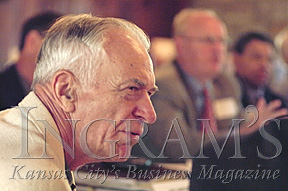
Dick Stolfus believes that the county
again can reclaim the
"All American community" designation.
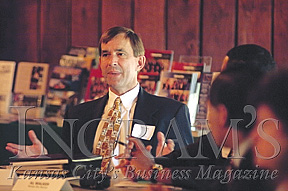
Dan Lowe reports "the single largest challenge" in
Wyandotte County is overcoming its negative image.
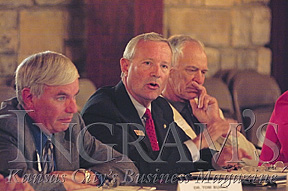
Commissioner Tom Cooley discusses some of the challenges
associated with attracting affluence to Wyandotte County.
Terry Robinson
told of being at Kansas State when the school didn’t win anything.
"But we built on pride until we had a coach that could back up that
pride." As to Wyandotte County, "We have to get the community
to understand what pride is, to walk forward based on pride."
Al Walker agreed. "If we set a level of expectation, create a standard
that we expect citizens to live up to and don’t accept anything less,
watch the city grow from there!" In the northeast part of the county,
he noted, this has already started. "
David Zimmer raised the issue of marketing Wyandotte County to companies
within the metropolitan area. Ten or 12 years ago, he noted, property
taxes in the county were high. Since then they have fallen back in line.
"Wyandotte County is not the evil person now," he joked.
"The largest single challenge," affirmed Dan Lowe, "is
overcoming the negative image Wyandotte County has had historically."
He observed ruefully that he has a difficult time selling a project in
the Kansas City area, but when he markets the county elsewhere, like in
Omaha or Chicago or Indianapolis, he has no trouble getting attention.
"There is a bias against Wyandotte County and KCK among the local
brokerage community," he lamented. Joked Bill Dunn in response, "Some
of the developers working in Wyandotte County are hoping some of the others
don’t figure that out."
Still, as Lowe pointed out, the old perceptions of high crime rates and
racial problems "still exist in a lot of people’s minds."
This is a hurdle that has to be overcome, he believes, if the county is
to attract serious investment capital. Deloris Pinkard countered that
"most of us who live here recognize the decline in the crime rate."
Having learned much about how to attract business and industry, the task
for county leaders now is "to share with our community what ourlong-range
plans are. Young people have to know now that there is something to come
back to." Irene Caudillo agreed: "We need to make young people
feel like this is their community."
Terry Robinson spoke of the need not to educate
just the students, but "the people in city who do not understand
what the county is doing." He commended the county for its improved
efforts in the last few years but cautioned, "We still need to do
better."
"We are an All-American community," said Ted Stolfus, referring
to the designation the city earned a few years back. This is something
he believes the county should continue to promote even to its own citizens.
"If we can win that award we can do anything," said Susan Rohrer,
who agreed this was a message that deserved repeating.
From the looks of things, Kansas City, Kan., and Wyandotte County seem
poised to win again.
To order additional copies of the Wyandotte County Economic Development
Report and Regional Publication, call Jim Ryan, 913.980.3997 or email
him at jryan@ingramsonline.com
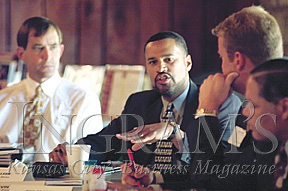
Al Walker of Kansas Gas Service discusses
the growth
potential of the County